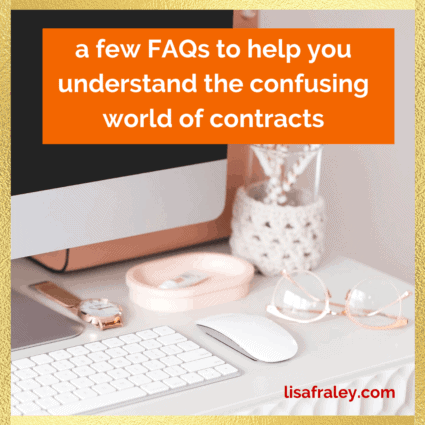A few FAQs to help you understand the confusing world of contracts
If I had a frequent flier point for every time I get asked about Client Agreements for 1-on-1 clients, my next trip to Italy would be totally free.
(BTW, someday post-COVID, Scott and I are definitely going back to Florence. And New Zealand. And British Columbia. I’ve also always wanted to go to Bermuda and St. Lucia too. Can you tell I’m totally missing travel right now??!)
I know contracts can feel overwhelming. Which kind do you need to use when? What should they say?
(Grab my free guide called “5 Critical Components of Every Client Agreement” guide HERE if you don’t have it yet.)
Here are a few FAQs to help you understand the confusing world of contracts…
1, What’s the true purpose of a Client Agreement?
The #1 reason to use a Client Agreement is to protect your income.
It also creates clarity about expectations.
It protects your work that you’ve poured HOURS over to develop (not to mention the blood, sweat, tears and dollars!) so if someone copies your stuff, you have legal backing.
It clearly spells out your client policies in one place – so your clients don’t have to dig through e-mails to remember your policies about refunds, missed calls, or cancellations to prevent headaches and awkward conversations later.
It helps you feel safe, secure, and confident because it does the heavy lifting for you if a client skips payment or cancels at the last minute (which is EXACTLY what you want it to do.)
And it creates a container to hold and support your client relationship and draws boundaries around your time and energy so you can show up as your best.
I align it with the sacral chakra which is associated with abundance, money, boundaries, creativity and relationships.
I could go on and on about how important Client Agreements are… but here’s FAQ #2:
2. When is the right time to enforce a contract?
When something goes wrong – a client stops paying you, or misses 3 calls, or issues a chargeback – how do you know when to take action?
You have the right to enforce your Agreement anytime a client oversteps a boundary or doesn’t hold up their end of the Client Agreement – in other words, as we say in legal-speak, when the client “violates a term of the Agreement.”
Enforcing a contract can take many forms. It could be calling the client and discussing the situation or sending an email and even actually bringing a lawsuit if a significant amount of money is in question and hasn’t been paid.
IMHO, the best option is to opt for emailing the client when you have a problem (rather than just talking by phone) so that you have proof that you have reached out to the client in writing to try to resolve the situation, and – this is key! – you have proof that you sent an email because you’ll have the date on the email when it was sent.
It’s totally up to you as to WHEN you decide to enforce the Client Agreement. You can always reach out to a lawyer for help and guidance if you’re not sure.
And another FAQ I’m often asked is:
3. How often do biz owners actually have to chase down clients for missed payments or cancelled calls?
The answer is: It depends. Sometimes newer coaches can feel leery of enforcing their boundaries around payments, refunds, or cancellations because they’re worried that they’ll lose clients, so they may end up with clients missing payments or rescheduling calls up to 30-35% of the time.
However, with more experience over time, biz owners tend to feel more comfortable holding their boundaries more often (with love, of course!). They may only chase down payments or reschedule calls 10-15% of the time, or even less often.
Usually, the longer you’re in business, the more comfortable you are using contracts and holding your boundaries around your client policies.
I hope this little Q&A was helpful to you. What questions do you have about using contracts? Feel free to reach out or submit a comment below. I’m always happy to help.
Here’s to better understanding the confusing world of contracts!
Need a Client Agreement for your 1-on-1 services? Learn more about my DIY Client Agreement here. It’s designed for coaches, holistic practitioners and online entrepreneurs, available 24/7, and written in plain English. WAAAAYYYYY more affordable than having a lawyer draft one for you from scratch and can be ready to use in less than an hour.
NOTE: If you’re a licensed practitioner who is wanting to get into the online space for 1-on-1 work, please book a free 20-minute Legal Chat with my team BEFORE you use a Client Agreement because it may not be right for you depending on what you want to do.



